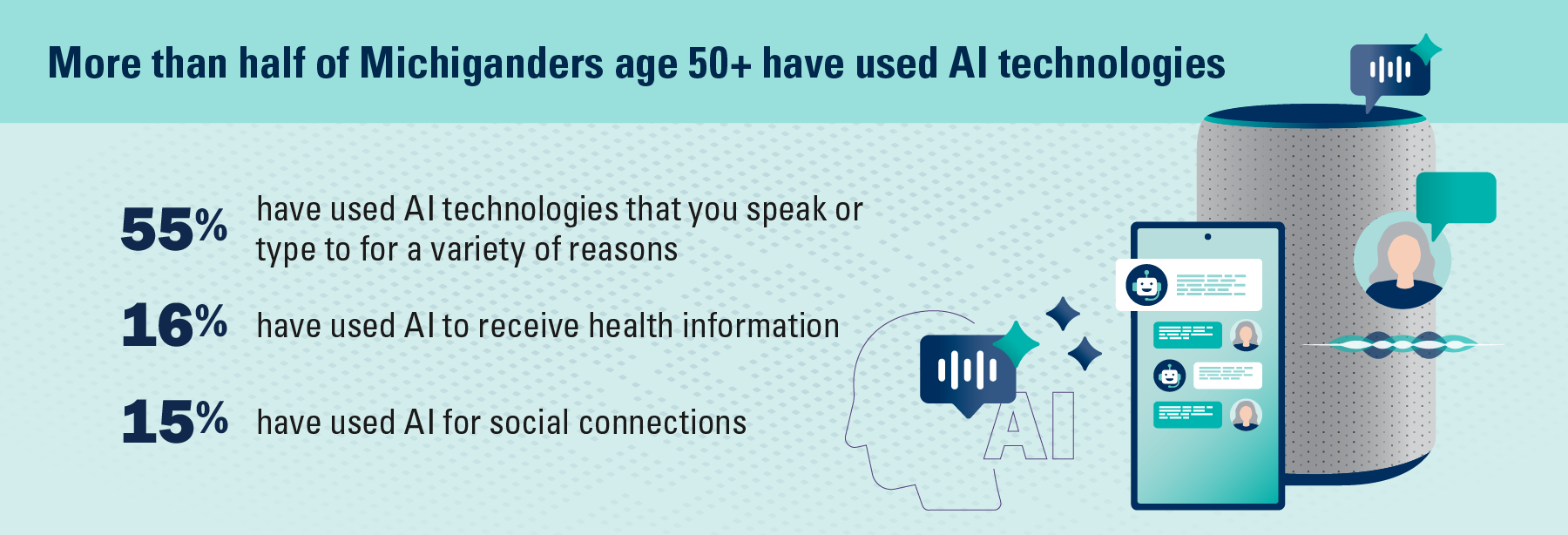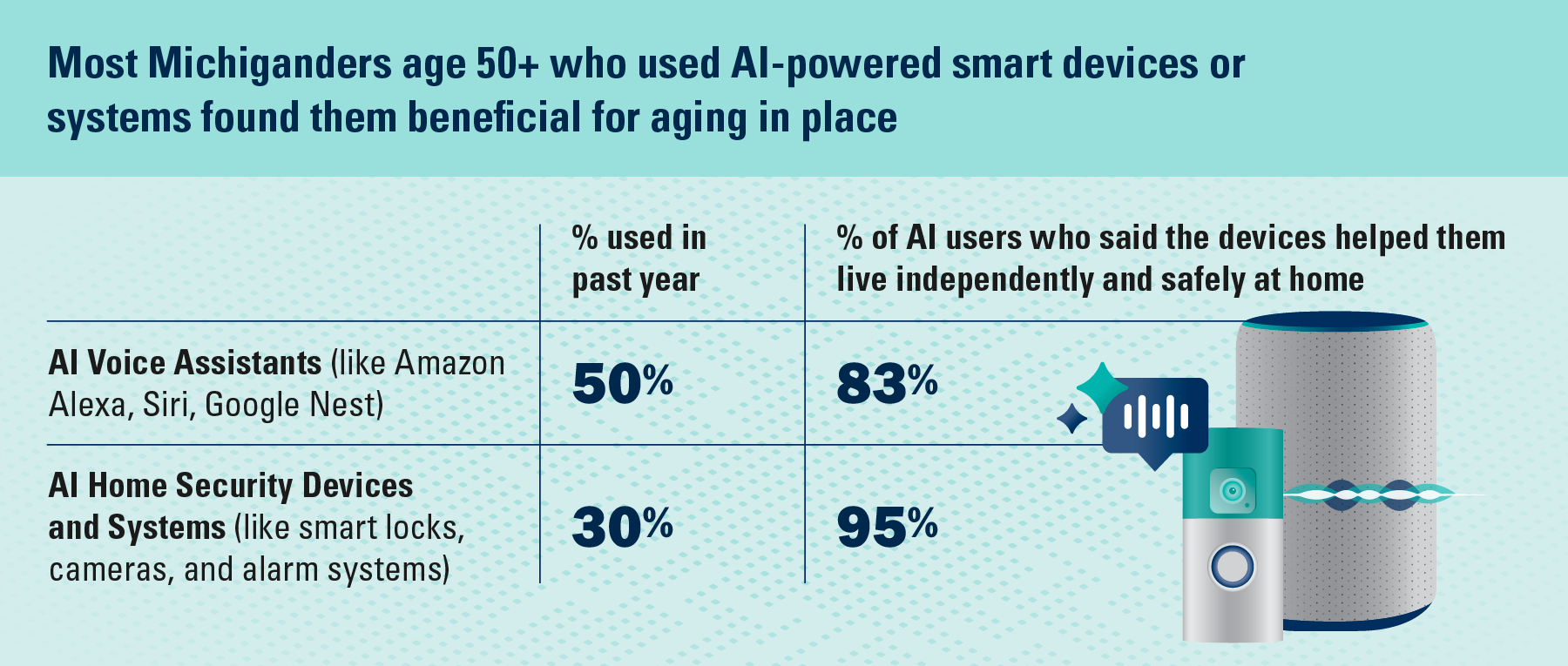
Key Findings in Michigan
- 55% of Michiganders age 50+ said they have used AI technologies that you speak or type to for a variety of purposes.
- 91% of older Michiganders agreed that they want to know if information they receive is from a person or generated by AI.
- 83% of older Michiganders who used AI-powered voice assistants in the past year said these devices help them live independently and safely in their home.
More than half of Michigan’s adults age 50 and older have ever used artificial intelligence technology, and 16% have used AI to receive health information, a new poll shows.
But nearly all older Michiganders (91%) believe AI-generated information should be clearly labeled, and half say they’re not confident they could spot misinformation generated by AI. More than half (55%) agree with the statement that AI will do more harm than good.
The new data came from the Michigan Poll on Healthy Aging, based at the University of Michigan Institute for Healthcare Policy and Innovation and supported by the Michigan Health Endowment Fund and Michigan Medicine, U-M’s academic medical center.

The poll shows that 55% of older Michiganders have used an AI technology that they spoke or typed to for a variety of purposes – the same percentage as older adults in the rest of the nation. This includes voice assistants such as Amazon Alexa, Apple’s Siri and Google Nest.
Of those who had used a voice assistant, 83% said it was somewhat beneficial or very beneficial for helping them live independently and safely in their home.
The poll also reveals that Michiganders over 50 vary in their use of AI technology and views about it, with differences by age, level of education or income, health and disability status, and region of the state.
The poll team has created an interactive data tool at https://michmed.org/GQkmw to allow anyone to explore the Michigan findings further.
The tool also shows how older Michiganders’ experiences with and views on AI compare with those of their peers in the rest of the country.
A National Poll on Healthy Aging report based on answers to the same questions by people 50 and older nationwide is available here.
The new poll suggests a need for more efforts to help Michigan’s older adults understand the pros and cons of AI, said Robin Brewer, Ph.D., M.S., an assistant professor in the U-M School of Information and a health AI researcher who worked with the poll team on the report.
“AI is here to stay, and our state has been ahead of the curve in both harnessing it for productive purposes and regulating against misuse of it in fields from university research to manufacturing to healthcare,” said Brewer. “Our older residents clearly show an interest in understanding what this means for them, while requiring disclosure of AI-generated information.”
She notes that Michigan passed some of the nation’s first state laws about labeling or limiting AI-generated content in political advertising, and more regulations are being considered.

Differences within Michigan
Use of AI technology was higher among Michiganders age 50 to 64 than among those age 65 and older, at 63% vs. 48%. AI technology use in Michigan also differed based on education and income level, with 63% of people over 50 who have a four-year college degree or higher having used AI, compared with 52% of those whose formal education did not include a bachelor’s degree.
An even greater divide was seen by income, with 63% of those who have household incomes of $60,000 or more having some experience using AI technology, compared with 49% of those with lower incomes.
The poll also shows that 59% of older Michiganders with a bachelor’s degree or higher said they had at least some trust in AI-generated information, compared with 48% of those with less than a bachelor’s degree. Overall, 51% of older Michiganders say they have at least some trust in AI-generated information.
Older adults who have health issues or disabilities were less likely to say they trust AI-generated information. About 42% of those who say they have a disability that limits their daily activities expressed some trust in AI, compared with 55% of those who do not have such a disability. There were similar differences between people in fair or poor physical or mental health, compared with those who said their physical or mental health is good to excellent.
This concerns poll director Jeffrey Kullgren, M.D., M.P.H., M.S., a primary care physician at the VA Ann Arbor Healthcare System and associate professor of internal medicine at U-M.
“Health care providers, aging-focused organizations and health care organizations should all take notice of these differences, especially as AI tools become more common in health care settings, including patient-facing tools,” he said.
When it comes to confidence in spotting misinformation in AI-generated content, older Michiganders are similar to their counterparts nationally, with 50% saying they’re not very or not at all confident they could identify it.
Older Michiganders were also similar to their peers nationwide in their attitudes toward learning more about the benefits and risks of AI, with 59% wanting to learn more about benefits and 82% wanting to know more about risks.
Michigan men over 50 were more likely than Michigan women over 50 to say they want to know more about the benefits of AI (64% vs 53%). Those living in the southeast part of the state were most likely to say they want to know more about AI benefits, with 67% saying so compared with 55% in the southwest and south-central parts of the state, 53% in the central and 49% in the northern part of the Lower Peninsula and the Upper Peninsula.
Older Michiganders who are veterans were also more likely than non-veterans to want to know more about the benefits of AI, with 70% expressing this interest compared with 57% of non-veterans.
There were also differences in older Michiganders’ interest in learning more about AI risks. Southeastern Michiganders, those living in urban and suburban areas, and those with higher incomes and levels of education, were all more likely to express interest in learning about AI risks than comparison groups.
The University of Michigan’s Michigan Online platform offers free and paid online learning opportunities about artificial intelligence, including free mini-courses about generative AI like ChatGPT. More online learning about AI is in development; anyone can sign up to be notified of updates.
Learn more about healthcare AI research and innovation by U-M faculty who are members of IHPI.
The national poll findings come from a nationally representative survey conducted by NORC at the University of Chicago for IHPI and administered online and via phone in February 2025 among 1,353 Michigan adults age 50-95 and to 2,525 non-Michigan adults ages 50 to 97. The sample was subsequently weighted to reflect the Michigan and national (non-Michigan) populations. Read past National Poll on Healthy Aging reports and about the poll methodology.